
In 2010, Aroldis Chapman showed everyone that it was possible to throw a baseball 105 mph.
In just his 10th game in the majors, Chapman threw the hardest recorded fastball in major league history.
Over the past decade, no one has thrown any harder. But with the continuing rise in overall fastball velocity, the reasonable question to ask is: What will the upper limits of velocity be in 2030?
Will we be discussing 108 mph fastballs a decade from now? Is 110 mph sitting over the horizon in the 2040s? And if so, what happens to hitters?
Calm your fears, hitters. According to experts, major league pitchers are already brushing against the velocity limits.
“It would totally shock me (if someone is throwing 107-108 mph in a decade),” said Dr. Glenn Fleisig, a biomechanist who is the research director at the American Sports Medicine Institute. “It would surprise me if maximum velocity goes up at all when compared to today.
“Velocity is very sexy,” Fleisig said. “People are in love with the radar gun . . . The maximum velocity that baseball pitchers can pitch is essentially not going to go up. What’s going to change is the ceiling is not going to go up, but it’s getting more crowded at the ceiling.”
Others agree.
“I could be wrong on this. I’m thinking peak velocity won’t increase much, but a 100 mile per hour fastball will be commonplace,” Reds minor league pitching coordinator and Driveline Baseball president Kyle Boddy said.
Denne historien er fra August 2020-utgaven av Baseball America.
Start din 7-dagers gratis prøveperiode på Magzter GOLD for å få tilgang til tusenvis av utvalgte premiumhistorier og 9000+ magasiner og aviser.
Allerede abonnent ? Logg på
Denne historien er fra August 2020-utgaven av Baseball America.
Start din 7-dagers gratis prøveperiode på Magzter GOLD for å få tilgang til tusenvis av utvalgte premiumhistorier og 9000+ magasiner og aviser.
Allerede abonnent? Logg på
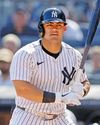
THE SERVICE TIME CONUNDRUM
MLB’s byzantine service time rules cloud rookie status and now PPI eligibility
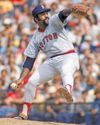
LUIS TIANT WAS MLB'S MOST SUCCESSFUL CUBAN PITCHER
On a scouting trip to Cuba in 1957, Bobby Avila discovered 16-year-old righthander Luis Tiant on the island's Juvenile League all-star team.
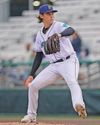
ORGANIZATION REPORT
Outfielder Heston Kjerstad's career has been unique, to say the least.

TOP 10 NL EAST
From the moment Thomas White stepped on a high school mound, he was viewed as the top lefthander available in the 2023 draft.

PREPARATION PAYS OFF
lowa politician J.D. Scholten makes a surprising return to pro ball at age 44

MAKING THE GRADE
Assessing the future value of graduated National League prospects
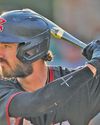
TOP 10 NL WEST
Even in high school, Bryce Eldridge could hit the ball a mile. The 6-foot-7 righthander could also touch 96 mph off the mound.
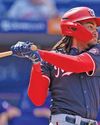
Wood Has Towering Upside- Nationals rookie James Wood also stands 6-foot-7 and also has game-changing power.
Aaron Judge and Oneil Cruz are 6-foot7 sluggers who stand out for their power in this year’s MLB Best Tools voting. Wood spent half of this season with Triple-A Rochester before making his MLB debut on July 1. While he was in the International League, he captured managers’ attention. Wood unanimously won Best Power Prospect and also claimed Most Exciting Player in a survey of league skippers. Wood hit .353/.463/.595 with 10 home runs in 52 games for Rochester. His .242 isolated slugging was the best for a player 21 or younger at Triple-A this season.
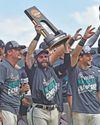
ROAD BLOCK?
Scholarship expansion puts mid-majors at a major disadvantage on the road to Omaha

ROYALS REVIVAL
A revamped and rejuvenated farm system has Kansas City ready to rebound